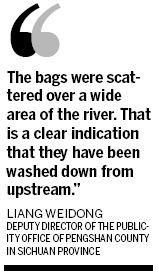More than 1,000 ducks found dead in Sichuan river
Updated: 2013-03-26 08:07
By Xu Wei (China Daily)
|
||||||||

Local authorities are investigating how more than 1,000 rotting ducks ended up in a river in Pengshan county, Sichuan province, days after thousands of dead pigs were retrieved from a Shanghai river.
The dead ducks, found in up to 60 woven plastic bags, are believed to have been washed downstream into the Pengshan section of the Nanhe River, said Liang Weidong, deputy director of the publicity office of Pengshan county.
"The bags were scattered over a wide area of the river. That is a clear indication that they have been washed down from upstream," Liang said.
Veterinarians from the provincial animal veterinary bureau in Sichuan province are trying to find out how the ducks died.
The bags of ducks found on the river were reported to the local environmental protection bureau on March 19. They were disinfected with lime and buried at a depth of 3 meters by local authorities a day later.
The carcasses did not pollute the river, the local environmental protection bureau said, and the incident will not threaten residents' water supply because there are no water plant intakes nearby.
Pengshan county is a major production area for duck meat, and the county's Baosheng township can produce more than 10 million ducks raised primarily for meat every year, according to the website of the animal veterinary bureau in Meishan city.
Raising such ducks can bring annual income of about 15 million yuan ($2.42 million) to 20 million yuan for local farmers, the bureau said.
Previously, more than 10,000 dead pigs were retrieved from the Huangpu River, a major source of tap water in Shanghai. Meanwhile, 50 dead pigs were found in a tributary of the Yangtze River in Yichang, Hubei province.
Experts have long called for more government efforts to regulate animal carcasses.
"The cases have shown that the knowledge and awareness of the disposal of animal carcasses is severely lacking among individual livestock breeders," said Ouyang Yan, a researcher on animal epidemic prevention at Hubei Three Gorges Polytechnic in Yichang.
To solve the problem, Ouyang said, the government should assess the capacity of animal farms to dispose of carcasses before granting approval for farmers to run them.
She said the government should provide subsidies to farmers for the disposal of carcasses to reduce risks from animal farms and to help authorities discover endemics as early as possible.
Xue Ruifang, a veterinarian in Pingding county, Shanxi province, writing in the Livestock and Poultry Industry Journal in November, said one local investigation found only 20 percent of animal carcasses are properly disposed of in rural areas.
"Individual pig breeders in rural areas generally do not know the harm caused by randomly dumping animal carcasses. They are also unwilling to spend money on such a problem," she said.
"A law that regulates the disposal of animal carcasses, especially in rural areas, is urgently needed right now."
The law should clearly define the penalties for randomly dumping or reselling animal carcasses and clarify who should take on the role of law enforcement, she added.
Huang Zhiling in Chengdu contributed to this story.
xuwei@chinadaily.com.cn
(China Daily 03/26/2013 page5)

 In Photos: 7.0-magnitude quake hits Sichuan
In Photos: 7.0-magnitude quake hits Sichuan
 Li Na on Time cover, makes influential 100 list
Li Na on Time cover, makes influential 100 list
 FBI releases photos of 2 Boston bombings suspects
FBI releases photos of 2 Boston bombings suspects
 World's wackiest hairstyles
World's wackiest hairstyles
 Sandstorms strike Northwest China
Sandstorms strike Northwest China
 Never-seen photos of Madonna on display
Never-seen photos of Madonna on display
 H7N9 outbreak linked to waterfowl migration
H7N9 outbreak linked to waterfowl migration
 Dozens feared dead in Texas plant blast
Dozens feared dead in Texas plant blast
Most Viewed
Editor's Picks

|

|

|

|

|

|
Today's Top News
Live report: 7.0-magnitude quake hits Sichuan, heavy casualties feared
Boston suspect cornered on boat
Cross-talk artist helps to spread the word
'Green' awareness levels drop in Beijing
Palace Museum spruces up
First couple on Time's list of most influential
H7N9 flu transmission studied
Trading channels 'need to broaden'
US Weekly

|

|







